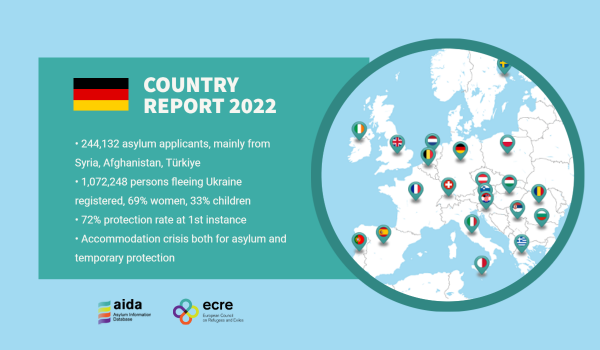The updated AIDA Country Report on Germany provides a detailed overview on legislative and practice-related developments in asylum procedures, reception conditions, detention of asylum seekers, content of international protection, as well as procedure for and content of temporary protection in 2022.
In 2022, a total of 244,132 applicants lodged applications for international protection in Germany, compared to 190,816 in 2021, mainly by Syrian, Afghan and Turkish nationals. The overall recognition rate at first instance was 72% (including national protection), but with wide variations depending on nationality: it stood at 99.9% for Syrians, 99.3% for Afghans, but only 29.4% for Iraqis and 35.2% for Turkish nationals, down to 1% for Georgians. Second instance decisions by courts granted protection to an additional 15,745 persons.
Concurrently, as of March 2023 German authorities had registered 1,072,248 persons fleeing Ukraine into the Central Register for Foreigners, out of which 778,779 held a residence permit for temporary protection. Over 2/3 of registered persons were women, and 1/3 were children. Although the definition of temporary protection is broader than that of EU law for third country nationals, there are reports of them being pressured into asylum procedures instead. Reception wise, initial reception capacity soon hit its limit, leading to the reopening of emergency shelters with inadequate living conditions, and overcrowding in first accommodation centres.
New legislation, applicable from 1 January 2023 onwards, was introduced through the Act on the acceleration of asylum court proceedings and asylum procedures. The reform notably foresees independent instead of state-run counselling for asylum seekers, a broader scope of revision by the Federal Administrative Court, and an overhaul of the grounds for cessation and revocation of international protection residence permits.
In October 2022, the Government launched a Federal admissions programme for Afghan nationals. The programme foresees 1,000 admissions per month until 2025 and targets persons deemed particularly at risk in Afghanistan such as human and women’s rights activities, persons having worked in critical areas such as justice, politics, media, etc, and particularly vulnerable persons due to gender, sexual orientation, gender identity, religion. Several federal States also initiated or prolonged ad hoc family reunification programmes for Syrians and Afghans, a welcome development given the persisting difficulties in the regular family reunification procedure: long waiting periods at embassies, and only 8,900 visas issued to family members of subsidiary protection beneficiaries out of the 12,000 quota places available. Lastly, Germany’s position on the relevant time to determine the age of the applicant or the sponsor in the case of (former) minors engaged in family reunification procedures was deemed contrary to EU law by the CJEU.
After halting the processing of asylum applications lodged by Syrians holding international protection in Greece in 2019, the BAMF resumed decision making in April 2022, leading to a decrease in the backlog for this group from 39,000 in December 2021 to 12,500 in December 2022. However, the BAMF decided to re-examine all cases on the merits instead of recognising the decision of the Greek authorities, a practice currently being challenged in national courts and which has led to a preliminary request to the CJEU. Over the course of 2022, the BAMF decided on a total of 43,091 such applications, out of which 4,983 were rejected although protection had been granted by Greek authorities.
As regards reception, capacity reached its limit in several Federal States and municipalities. Several emergency centres, such as exhibition grounds, made-up tent facilities, were re-opened, especially in larger cities, with living conditions below standards. Regular reception centres were also overcrowded, leading to deteriorating living conditions. The general housing crisis in Germany means beneficiaries of international protection also struggle to enter the housing market and have to stay in reception centres. As regards social benefits, the Federal Administrative Court ruled that single adults living in mass accommodation are entitled to the same amount of financial benefits as those living in private housing, contradicting the assumption that those in mass accommodation necessarily economise by living together.
For further information:
- Find comparative information in the Asylum Information Database (AIDA) managed by ECRE

